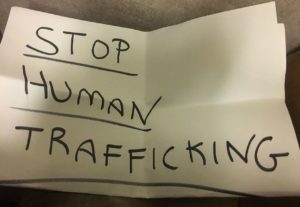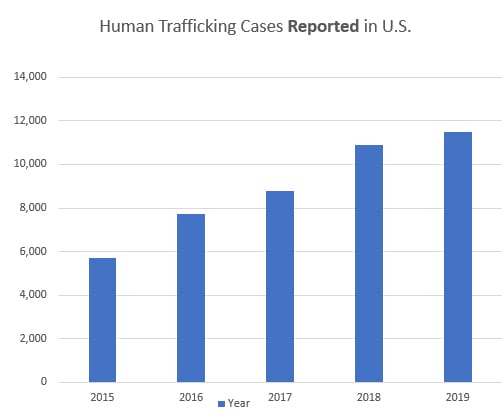NEW YORK – The World Day Against Human Trafficking is observed annually on July 30. Despite the official observation, the vast majority of Americans will not be aware of the special day and its events. It’s unlikely that many will even give the subject matter a second thought.

That’s probably not because they do not care, so much as it is that they believe that human trafficking happens on the other side of the planet. They feel certain that human trafficking is not a problem in America.
They are wrong!
According to World Population Review,
A common misconception about human trafficking is that it does not happen in the United States. This is false, as the United States is ranked as one of the worst countries globally for human trafficking. It is estimated that 199,000 incidents occur within the United States every year.
I believe there are two reasons that Americans don’t grasp the magnitude of the human trafficking problem in our own country.
- We are more concerned about maintaining our own incomparable, comfortable lifestyle than the plight of others.
- We allow the marketing media from multitudes of nonprofits informing us of the human trafficking problems in Africa, Asia, and Europe to make us think that it happens there – not here. Let’s be clear. Those organizations are not to blame. They need support for their work. We limit our perception of human trafficking as being their problem and remain blissfully unaware that we have the same problem.
Houston, we have a problem!
 The chart to the right is derived from The National Human Trafficking Hotline in the United States.
The chart to the right is derived from The National Human Trafficking Hotline in the United States.
Clearly, not only do we have a human trafficking problem, but it is also getting worse year by year.
These are just the number of confirmed, reported cases.
California, Texas, Florida, and New York were the four states with the highest rates of human trafficking. On a per-capita basis, however, Nevada leads the nation, followed by Mississippi, Florida, and Georgia.
Based on a supply and demand model, Forgotten Children, Inc. reveals that
Houston, Texas, and the state of Arizona are the two main areas in the United States for human trafficking . . . Most victims are ages 12 to 17, and their lifespan is about seven years once they get involved in human trafficking.
What must we do?
Awareness is the key. We must realize that, whether we see it or not, human trafficking is a growing problem in the United States. If you have read this far, you have made the first step.
Acquiring and absorbing information regarding human trafficking in the United States is a good second step. This should include gaining an understanding of what human trafficking looks like within your personal sphere of influence.
- The United Nations Office on Drugs and Crime has published a Human Trafficking Indicator intended to help us recognize dozens of signs of potential human trafficking that may be happening in our own neighborhoods.
- The S. National Human Trafficking Hotline 2019 Data Report furnishes additional relevant data and insights worth noting.
We need to actively participate in and with state, local, and national efforts to reduce the specter of human trafficking. A Google search for government and non-governmental agencies should offer not only many options for investigation but also for participation.
Some of these organizations concentrate upon building sustainable support systems for those who have been physically, emotionally, and mentally abused during their personal time of trial. Recovery is a difficult process, but organizations like Forgotten Children, Inc. are gaining ground in communities across America. Find out how you can help them impact your community.
Make your family, friends, and co-workers aware of your investigation. Enlist their support.
Save the toll-free phone number of the National Human Trafficking Hotline (888-373-7888) so that you may be able to discreetly contact them should a potential trafficking situation appear to present itself.
Become a part of the solution.
Read more news on Human Trafficking and Human Rights on Missions Box.
Read a special report on how human trafficking has grown during COVID-19.
Sources:
- Compassion, World Day Against Trafficking in Persons
- Forgotten Children, Inc., Working to End Human Trafficking
- World Population Review, Human Trafficking Statistics By State 2021
- United Nations Office on Drugs and Crime, Human Trafficking Indicators
- National Human Trafficking Hotline, Hotline Statistics




